Challenge Health

Can sports provide a platform for individuals to challenge themselves and reach their full potential ?
**Summary:** This essay posits that sports provide a comprehensive platform for individuals to challenge themselves and reach their full potential. It explores how sports offer psychological benefits such as mental toughness, goal setting, and confidence building; physiological benefits including improved physical fitness, skill development, and resilience; and social benefits like teamwork, leadership, and camaraderie. Personal stories of overcoming adversity further underscore the transformative power of sports in personal growth. The conclusion affirms that sports are not just about physical activity but are a means to unlock human potential holistically.

How do outdoor sports like hiking or mountaineering foster a deeper connection with nature and improve mental health ?
The text discusses the connection between outdoor sports, particularly hiking and mountaineering, and mental health. It highlights how these activities offer physical benefits such as fresh air and sunlight, which boost mood and energy levels, and the release of endorphins through physical activity. Mentally, being in nature encourages mindfulness and presence, reducing stress and anxiety, while the grandeur of nature can provide perspective on everyday worries. Physical challenges build stamina and resilience, with a sense of accomplishment from completing trails or reaching summits. Mental challenges include problem-solving and building resilience. Social interaction through shared experiences and forming supportive communities is also beneficial. Personal growth aspects include self-reliance and adaptability. The mind-body connection is emphasized through the meditative effects of nature and sensory engagement, as well as the physical well-being derived from cardiovascular health and muscle strength. Overall, outdoor sports like hiking or mountaineering provide numerous opportunities for improving mental health through various means.

How does sea level rise impact public health, especially in coastal areas ?
Sea level rise, driven by global warming and climate change, poses significant threats to public health in coastal areas through flooding and storm surge, waterborne diseases, environmental health hazards, mental health concerns, economic impacts, and social determinants of health. Addressing this challenge requires a multifaceted approach that includes adaptation strategies, improved infrastructure resilience, and mitigation efforts to reduce greenhouse gas emissions.
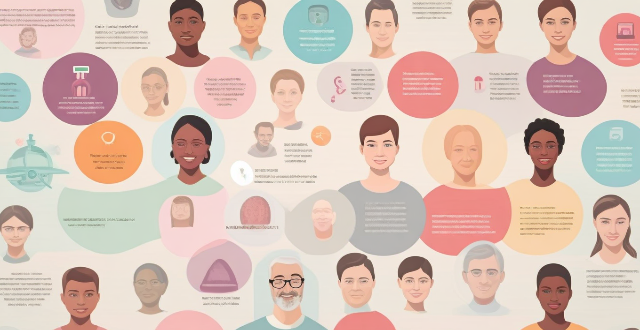
What are the key challenges facing global health security today ?
Global health security faces several key challenges, including emerging infectious diseases, antimicrobial resistance, weak health systems, political instability and conflict, and social determinants of health. These challenges threaten the well-being of people worldwide and require collective efforts to prevent, detect, and respond to infectious diseases that threaten human health.

How does climate change affect human health ?
Climate change affects human health in numerous ways, including increased risk of extreme weather events like heatwaves, floods, and hurricanes that can lead to dehydration, injuries, and displacement. Changes in disease vectors due to warmer temperatures allow the spread of mosquito-borne and tick-borne diseases. Longer growing seasons result in higher pollen counts, worsening allergies, while wildfires and dust storms reduce air quality causing respiratory issues. Food security is also affected as droughts and extreme temperatures can lead to crop failures and malnutrition. Mental health impacts include stress and anxiety from disaster-related trauma and economic stress. Addressing this challenge requires adaptation strategies, mitigation efforts, and public health preparedness.

What are the current global health challenges ?
The world is facing a multitude of health challenges that require immediate attention and action, including infectious diseases, non-communicable diseases, mental health issues, and environmental health hazards. Infectious diseases such as COVID-19, HIV/AIDS, tuberculosis, and malaria continue to be a major threat to global health. Non-communicable diseases like cardiovascular diseases, cancer, diabetes, and chronic respiratory diseases are becoming increasingly prevalent globally. Mental health disorders, including depression, anxiety disorders, and substance abuse, are a growing concern worldwide. Environmental factors such as air pollution, water pollution, climate change, and natural disasters also pose significant risks to human health.
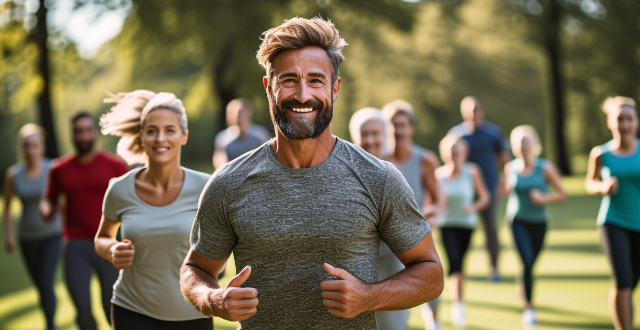
Is there a difference in mental health benefits between individual and group exercises ?
Exercise plays a vital role in maintaining good mental health, with both individual and group exercises offering unique benefits. Individual exercises provide flexibility, focus, and personal challenge, while group exercises offer social support, motivation, and accountability. Both types of exercise have been shown to reduce stress, anxiety, and depression while improving mood, self-esteem, and cognitive function. Ultimately, finding an activity that you enjoy and can consistently incorporate into your lifestyle is key to maintaining good mental health through exercise.

How can we balance public health concerns with economic recovery during pandemic management ?
Balancing public health concerns with economic recovery during pandemic management involves implementing widespread testing, efficient contact tracing programs, vaccination campaigns, and clear public health messaging. It also requires targeted restrictions, financial aid, adaptive workplaces, infrastructure investments, and building consumer confidence. Long-term planning includes strengthening health systems, fostering economic diversification, investing in research and innovation, and creating emergency funds. Collaborative governance through intersectoral collaboration, global cooperation, and stakeholder engagement is essential for navigating the dual challenge of protecting public health while fostering economic stability and growth during a pandemic.

How is climate change affecting children's health ?
The text discusses the impacts of climate change on children's health, which are both direct and indirect. Direct effects include increased respiratory issues due to pollen and allergens, vector-borne diseases, heat-related illnesses, and nutritional deficiencies. Indirect effects encompass mental health challenges like trauma and displacement, educational disruptions such as school closures, and social and emotional development issues. The conclusion emphasizes the need for immediate attention and interventions to address these challenges, focusing on strengthening children's resilience through healthcare, educational support, and nurturing environments.

What is the difference between cardiovascular and resistance training in health management ?
The text discusses the differences between cardiovascular and resistance training, highlighting their unique benefits and examples of each. Cardiovascular training strengthens the heart, aids in weight management, and improves endurance, while resistance training enhances muscle strength, bone density, and metabolism. Combining both types of exercise leads to a well-rounded fitness regimen that addresses multiple aspects of health, including endurance, strength, flexibility, and balance. The text suggests ways to incorporate both forms of exercise into a workout routine for optimal health management.

What are the benefits of sports for mental health ?
The benefits of sports for mental health are multifaceted and significant, contributing to an individual's overall well-being in numerous ways. The positive impact of physical activity on mental health is well-documented, offering a range of advantages that extend beyond the boundaries of physical fitness. One of the most compelling benefits of engaging in sports is the significant reduction in the risk of depression. Engaging in sports not only aids in combating depression but also helps in reducing anxiety levels. Regular exercise, especially if incorporated as part of a sports routine, can significantly improve sleep patterns. Participating in sports boosts energy levels, making individuals feel more vibrant and alive. Sports provide a platform for individuals to challenge themselves, overcome obstacles, and achieve goals. These experiences can build resilience, an essential trait for maintaining good mental health. Engaging in sports often involves interaction with others, whether as part of a team or through individual competition. This social aspect of sports can provide a sense of community and belonging, which is vital for mental well-being. Through sports participation, individuals can expand their social networks and establish support systems. Having a network of peers who share similar interests and goals can offer emotional and moral support, which is crucial for mental health maintenance. Team sports, in particular, offer opportunities to develop teamwork and communication skills. These skills are transferable to various aspects of life and can enhance interpersonal relationships, contributing to better mental health. Sports provide a structured environment for setting and achieving goals, which can boost self-esteem and a sense of accomplishment. Participating in sports requires discipline and time management, skills that are beneficial both on and off the field. Sports allow individuals to explore their limits and potential, pushing themselves to reach new heights.

What are the key challenges in developing countries for adapting to climate change ?
Adapting to climate change is a complex and multifaceted challenge that affects all countries, but developing nations often face unique obstacles due to their limited resources, infrastructure, and capacity. Here are some of the key challenges they encounter: 1. **Economic Constraints**: Many developing countries lack the financial resources needed to implement large-scale adaptation measures. Economies heavily reliant on agriculture, fishing, or tourism are particularly vulnerable to climate impacts. The cost of technologies required for adaptation can be prohibitively expensive. 2. **Infrastructure & Technology**: Existing infrastructure may not be designed to withstand increased extreme weather events. There is often a lack of access to advanced technologies that could aid in adaptation efforts. 3. **Socio-Political Factors**: Unstable political environments can hinder long-term planning and investment in adaptation strategies. Marginalized communities often have less access to resources and information, making them more vulnerable to climate impacts. Climate change can cause mass migrations, straining social services and increasing tensions. 4. **Information & Education**: Reliable climate data is essential for adaptation planning, but many developing countries lack this data. Limited education about climate change can lead to a lack of understanding about its risks and the need for adaptation. 5. **Health Impacts**: Warmer temperatures can expand the range of disease vectors like mosquitoes, leading to increased health risks. Extreme weather events can disrupt healthcare services, making it difficult to treat climate-related health issues. 6. **Environmental Concerns**: Climate change accelerates the loss of biodiversity, which can have cascading effects on ecosystems and human well-being. Pressure to convert forests to agricultural land increases vulnerability to climate impacts and reduces carbon sinks. 7. **Conclusion**: Adapting to climate change requires a comprehensive approach that addresses these challenges head-on. It involves building resilience through economic diversification, strengthening infrastructure, enhancing governance and social systems, improving access to information and education, protecting public health, and conserving the environment. For developing countries, overcoming these challenges is not just about survival; it's about ensuring a sustainable future where growth and development can thrive amidst a changing climate.

What are the main challenges in achieving carbon neutrality ?
Achieving carbon neutrality is a complex and multifaceted challenge that requires a coordinated effort from governments, businesses, and individuals. Some of the main challenges include economic implications, technological barriers, political will, public awareness and participation, natural resource constraints, energy demand growth, existing lock-in effects, legislative and regulatory hurdles, cultural and social factors, and research and development needs. It's a daunting task, but one that is necessary for the long-term health of our planet.

What are the main challenges faced by low-income countries in achieving sustainable development ?
Low-income countries face numerous challenges in achieving sustainable development, including poverty reduction, environmental protection, social inclusion, and institutional capacity. Addressing these challenges requires a comprehensive approach that involves collaboration between governments, civil society organizations, and international partners.

How can online platforms be utilized to promote physical activity and healthy lifestyles ?
In the digital age, online platforms have become aIn the digital age, online platforms have become a disseminating information and online platforms have become a pivotal tool for disseminating information and fostering community engagement. These platforms can be effectively utilized to encourage physical activity and promote healthy lifestyles. Here's how: Educational Content Creation: Health and Fitness Blogs share informative articles about the benefits of regular exercise, nutritional guidance, and tips for maintaining a healthy lifestyle. Interactive Q&A Sections encourage readers to ask questions and engage in discussions about health-related topics. Video Tutorials and Workouts post home exercise routines that can be done at home without equipment. Live-Streamed Classes host live workout sessions where participants can join in real time and get motivated by others. Online Challenges and Competitions: Step Challenges use apps that track steps and create challenges for users to reach a certain step count within a given period. Community Leaderboards set up leaderboards to showcase top performers and encourage friendly competition. Healthy Eating Contests challenge participants to share photos of their healthy meals with a dedicated hashtag. Weekly Themes introduce weekly themes like "Meatless Monday" or "Water Wednesday" to focus on specific dietary habits. Social Media Engagement: Inspirational Posts share success stories about individuals who have achieved significant health milestones through physical activity and good nutrition. Daily Motivational Messages post daily messages to inspire followers to stay active and maintain a positive mindset. Interactive Features create fun quizzes related to health facts or polls about preferred types of workouts. Live Chats with Experts organize live chat sessions with fitness coaches or nutritionists for instant advice and tips. Virtual Support Groups: Online Forums and Communities establish forums where people can discuss their progress, challenges, and support each other. Accountability Partners match users with accountability partners to keep each other motivated and on track. Webinars and Workshops host webinars on topics such as stress management, sleep hygiene, and meal planning. Interactive Workshops offer workshops where participants can learn new skills like cooking healthy meals or practicing yoga. Gamification: Rewards and Recognition award badges or certificates to users who complete certain challenges or reach their goals. Points Systems implement a points system where users earn points for exercising or making healthy choices, which can be redeemed for rewards. Fitness App Integration connect popular fitness apps to allow users to sync their data and track their progress more easily. Virtual Reality Games develop or promote VR games that involve physical movement as part of gameplay.
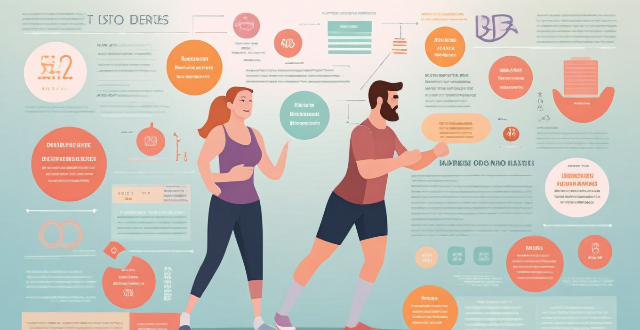
What are the benefits of strength training for overall health ?
Strength training offers numerous benefits for overall health, includingStrength training offers numerous benefits for overall health, includingurance, increased bone density Incorporating strength training into your fitness routine can help you achieve a healthier, stronger, and happier life.

How often should I exercise to maintain good bone health ?
Exercise is crucial for maintaining good bone health, but the frequency and intensity required vary depending on individual factors. Regular exercise strengthens bones, improves balance, and reduces the risk of falls and fractures. The recommended exercise guidelines for adults are at least 150 minutes of moderate-intensity aerobic exercise per week and two or more days of strength training per week. For older adults, it's important to consult with a healthcare professional before starting any new exercise program. Other factors that impact bone health include diet, smoking, and overall health status.

How do public health policies tackle the issue of obesity through promoting sports and exercise ?
How Public Health Policies Address Obesity by Encouraging Sports and Exercise.

Can using a health management app reduce the risk of chronic diseases such as diabetes or heart disease ?
Health management apps can help reduce the risk of chronic diseases by monitoring health metrics, providing insights, promoting healthy habits, and issuing reminders. However, over-reliance, inaccuracies, and privacy concerns are downsides to consider. While beneficial, these apps should not replace professional medical advice.

What role does access to healthcare play in mitigating the health effects of climate change ?
The text discusses the role of healthcare accessibility in mitigating the health effects of climate change. It highlights the importance of preventive care, emergency response, and chronic disease management in reducing vulnerability to climate-related health risks. The text also explores direct and indirect effects of climate change on human health, such as heat-related illnesses, respiratory issues, vector-borne diseases, mental health impacts, nutritional impacts, and displacement and migration. Finally, it suggests adaptation strategies for healthcare systems, including building resilient infrastructure, integrating climate change considerations into public health systems, and training community health workers on climate change impacts.
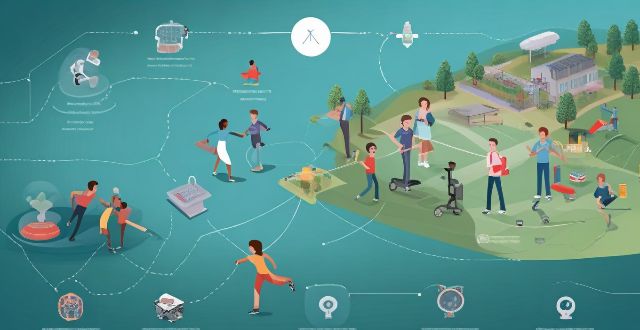
What are the potential risks and challenges associated with the increasing reliance on technology in sports ?
The integration of technology in sports has revolutionized the way games are played, watched, and analyzed. However, this increasing reliance on technology also brings several potential risks and challenges that need to be addressed, including overreliance on technology, cheating and unfair advantages, data privacy and security concerns, cost and accessibility issues, and health concerns related to excessive use of certain technologies. Addressing these challenges is crucial for maintaining the integrity and fairness of sports while still enjoying the benefits of technological advancements.
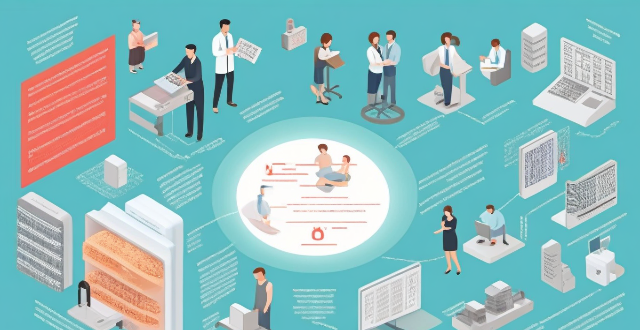
How does vaccine distribution affect public health ?
Vaccine distribution is crucial for global health, reducing disease incidence and healthcare costs while increasing productivity. Challenges include inequitable access, logistical complexities, and public perception issues.

What are the psychological effects of climate change on children, and how can their mental health rights be protected ?
The psychological effects of climate change on children are significant and can include anxiety, fear, depression, trauma, and grief. To protect children's mental health rights, it is important to educate them about climate change, provide access to mental health services, create safe spaces for expression, and encourage advocacy and action.

How does a balanced diet impact women's bone health ?
Balanced diet is crucial for women's bone health, including preventing osteoporosis. Key nutrients are calcium, vitamin D, protein, and phosphorus. Fruits and vegetables also support overall well-being.

What is the role of the World Health Organization (WHO) in promoting global health ?
The World Health Organization (WHO) plays a crucialThe World Health Organization (WHO) plays a crucial by providing leadership, setting norm WHO's work is focused on improving health outcomes worldwide through various activities such as convening stakeholders, establishing international standards for health, generating scientific knowledge to inform policy decisions, providing technical support to countries, and monitoring global health trends.

How can countries improve their preparedness for global health emergencies ?
Countries can improve their preparedness for global health emergencies by strengthening healthcare infrastructure, developing surveillance and early warning systems, enhancing international cooperation, improving public health education and awareness, and establishing contingency plans and policies.

What are the long-term health consequences of climate change ?
The long-term health consequences of climate change are multifaceted and can be categorized into several key areas, including increased frequency and severity of heat waves, extreme weather events, spread of diseases, air quality issues, food insecurity, and mental health impacts. These effects have far-reaching implications for public health and require urgent action to mitigate their impact.

What are the challenges faced by immigrants in terms of cultural integration ?
Immigrants face numerous challenges in cultural integration, including language barriers, employment difficulties, sociocultural differences, legal and policy issues, educational hurdles, housing and settlement problems, and healthcare access concerns. Addressing these challenges is crucial for building inclusive communities where immigrants can successfully integrate and thrive.

Why is vaccine equity important for global health ?
Vaccine equity is crucial for global health as it ensures fair distribution of life-saving vaccines worldwide. It helps prevent disease outbreaks, reduce health inequalities, promote economic stability, and improve overall health outcomes. By ensuring everyone has access to vaccines, we can create a healthier world for all.

How important is hydration in maintaining women's health ?
Proper hydration is crucial for women's health, affecting body temperature regulation, joint lubrication, digestion and nutrient absorption, waste elimination, skin health, weight management, and support during pregnancy and breastfeeding. It is recommended that women drink at least eight glasses of water per day, with individual needs varying based on age, activity level, and climate.